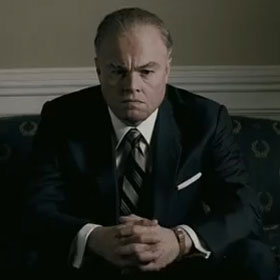J. Edgar

3.5/5
It seems oddly appropriate that as America contemplates a tumultuous, polarizing decade in the nation’s history; beginning with the most devastating terrorist attack ever suffered on American soil and ending with some of the largest, most unanimous displays of public outrage and civil unrest – on both ends of the political spectrum – that we should revisit, if not reconsider, the legacy of one John Edgar Hoover. In the course of a career spanning almost fifty years – eight different presidents – Hoover was one of the first men to put forth the notion that you sometimes need to bend the law in order to enforce it, curb liberties in order to preserve them, and besmirch ideals in order to uphold them.
Hoover’s legacy as an upstanding lawman and an innovator (he helped pioneer what we now know as forensic science, and personally championed the notion of a centralized databank for fingerprints) is largely overshadowed by retrospective scandal relating to his practice of compiling dossiers on political opponents, harassing dissidents and activists, and illegally surveilling anyone he deemed to be dangerous or potentially subversive. A life defined by secrets – quietly collecting those of other people while fiercely guarding his own – the rumors of implied homosexuality, drug use, and, most famously, cross-dressing hounded him until the very end of his, dying an unmarried workaholic at the age of seventy-seven convinced that he could see Communist subversion every which way he turned.
In the hands of the old master, Clint Eastwood, Hoover’s story is yet another meticulously crafted, emotionally distant, period melodrama that studies its subject diligently without ever really illuminating what made this complicated, contradictory man tick. It’s not quite the dazzling return to form the picture promised, but it is a noticeable uptick in quality following the risible dreck that was Hereafter. There it seemed finally Eastwood ran out of breath, his famously “unfussy” style starting to look a little sloppy, and his “efficient” nature on set given way to self-indulgence in the edit suite. J. Edgar still boasts all the warmth of a meat locker, and is at least fifteen minutes too long, but it’s as well put together as anything the elder statesman has done this side of the new millennium.
At the center is a fiercely committed turn from Leonardo DiCaprio, who has quietly and without fuss transformed himself into arguably the finest actor in Hollywood. It’s a tough beginning, mind; with DiCaprio seemingly acting by way of accent (see Russell Crowe’s recent output) and the snatched-at nature of the groundwork jarring and incoherent. Soon enough, though ,the dance across chronology – playing junior G-man at the site of the 1919 anarchist bombings before their was such a thing, appointment to the position of FBI Director at the age of 24, his uneasy alliance with the Kennedy’s – begins to find a rhythm, and an consistency of inconsistencies begins to bleed through that, whether deliberate or not, reflects Edgar’s tendency of self-embellishment. Recounted in his own words to a revolving door of biographers, who at first flatter the man’s ego before inevitably disappointing him. It’s a testament to Milk scribe Dustin Lance Black – who after this will join an illustrious fellowship of name screenwriters – to lend some humanity to what is on paper a potentially dry biography of a somewhat unlikable man.
It’s during the more provocative moments – shining light and casting some well-researched aspersions on certain quirkier aspects of Hoover’s private life – that the film is at its most effective. Judi Dench as Hoover’s mother is intense in her quiet intimidation as a woman who once journaled, “I’d rather have a dead son than a daffodil son.” But Dench brings a gentle, world-weary understanding to a character that on the page might seem a tyrant. After all, this was pre-sexual revolution and it’s not as if anyone was loud and proud at the time. Given her fierce devotion to him it becomes understandable how a man as iron-willed as Hoover might by day butt heads with some of the most powerful figures of the age and by night literally go home to mommy for council as to whether or not he was doing the right thing?
Yes, the issue of cross-dressing is briefly touched upon, but in a way that is entirely in keeping with the character up to that point. And there can be little doubt as to Hoover’s closeted sexuality, with his unspoken, lifelong relationship with Clyde Tolson (a pitch-perfect Armie Hammer) being one of the pictures two major through lines, the other being the Lindbergh kidnapping. It’s in these later sequences, when Hoover and Tolson are substantially older that the cracks begin to appear and widen substantially, and it’s here that questions again begin to arise about the Great Man, Eastwood, and his standards as relates to his stamina.
At the grand old age of 81 Eastwood is essentially churning out a picture a year at this point, and reportedly rattled through J. Edgar’s shoot in just 39 days, which for a period piece is just astonishing. Yet, you can’t help but feel that a little more rehearsal time might have helped both Hammer and DiCaprio get to grips with the elderly aspect of their respective elder statesman. Two fit young men (and add Naomi Harris to this, even though her life-long secretary/confident barely gets a look-in) doddering around in make-up, feigning infirmity, just looks like dressup – $30 million dressup to be sure, but still dress up nonetheless. And the man himself is, at the end of the day, something dry, closed-off – certainly closeted – and ultimately impenetrable. The man’s legacy is undeniably fascinating. The man himself, substantially less so.
RELATED ARTICLES
Get the most-revealing celebrity conversations with the uInterview podcast!







Leave a comment